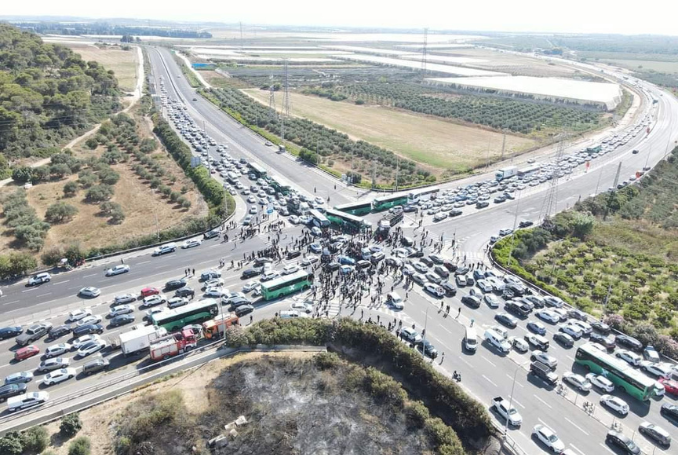
By Jamil Khader
The Israeli apartheid police is part of the problem and cannot be relied upon to protect the unequal citizens of the apartheid Jewish ethnocractic state.
Three weeks ago, I attended the henna party of my cousin’s son in my hometown, Fureidis, one of the only two towns in the Haifa district that survived the Nakba. The festive celebration, which was held at the open court of a local high school, took an abrupt and devastating turn when, amidst the vibrant dabka dance, guests started running up the nearby hill after someone reported hearing gunshots and that the victim was in a critical condition.
Amid the chaos and fear that swept through the crowd, we learned about the tragic loss of A’laa Mar’i, a 33-year-old father of three and the mayor’s aide, who fell victim to three bullets. He was pronounced dead at the crime scene.
A’laa’s murder sent shockwaves throughout the town and the indigenous Palestinian Arab community in the apartheid Jewish ethnocratic state. The following day, residents blocked the main intersection on state road 4 near the town to protest the unwillingness of the Israeli apartheid police and government to address and combat the alarming rise in violence, especially violence related to organized crime, that has plagued our communities.
Over the last five years, the number of murders attributed to organized crime-related violence in Palestinian Arab towns has surged by 58%. Almost 70% of homicide victims in the apartheid Jewish ethnocratic state are Palestinian Arabs. Since the beginning of this year, this ongoing pandemic has resulted in the tragic loss of over 138 individuals, including 11 women, 10 children, and men, in the indigenous Palestinian Arab community. In July of this year alone, 28 precious lives were lost to this violence pandemic. This figure is more than double the number of recorded deaths at the same point last year.
Amidst this alarming situation, leaders and community organizers in the Palestinian Arab community have held the apartheid police accountable for the escalation of organized crime-related violence. They somehow expect the apartheid law enforcement establishment to provide the necessary protection for its unequal Palestinian Arab citizens.
Organized Crime and the Israeli Apartheid police: ‘A State within a State’
However, the Israeli apartheid police is part of the problem and cannot be relied upon to protect the unequal citizens of the apartheid Jewish ethnocractic state. First, the Israeli apartheid police frame the violence pandemic in the indigenous Palestinian Arab community within racist Orientalist discourses that ascribe violence to Arabs’ nature and mentality.
In a leaked recording, apartheid Police Commissioner Kobi Shabtai was heard telling far-right national security minister Itamar Ben Gvir of Jewish Power (Utzmah Yehudit), “Mr. minister, there is nothing that can be done. They kill each other. That is their nature. That is the mentality of the Arabs.” Such statements are a manifestation of the deeply ingrained racism within the system and its failure to address the root causes of the issue.
More importantly, as scholars have pointed out, the Israeli apartheid police is implicated with criminal organizations, effectively serving as “incubators” for the growth of these organizations. Reports indicate that the Israeli apartheid police offered immunity to some criminals in return for obtaining intelligence information, and at times, released suspects based on directives from government officials. In addition, reports have shown an exponential increase in violent crimes within Palestinian Arab towns where police headquarters have been established.
In response to the recent horrific double murder in Jesir Alzarqa, a town about 12 kilometers to the southwest of Fureidis, local residents blasted the apartheid police for its complicity in these crimes. Local residents complained that the police is “busy writing tickets and fines for illegal vegetable vendors, but did not move a finger to make any arrests in these homicide cases.”
Protestors in Fureidis drew attention to the swift mobilization of resources by the Israeli apartheid police to escalate surveillance measures and suppress those protesting the violence pandemic in Palestinian Arab towns. Ironically, the police took no action to apprehend the murderers and perpetrators of violence, even though videos of some of these crimes circulate freely on social media.
Re-framing Organized Crime: Settler-Colonialism and Neoliberalism
Scholars have argued that combatting organized crime in the indigenous Palestinian Arab communities is not one of the priorities of the apartheid Jewish ethnocratic state, if at all. The state selectively intervenes only when it seeks to implement mechanisms and measures that reproduce and perpetuate structures of Jewish supremacy, institutional racial inequality, and socio-economic disparities.
These scholars examine organized crime in the Palestinian Arab community at the intersection of settler colonial practices and neoliberal policies. They demonstrate that organized crime did not only flourish in a racist state founded on the violence and ethnic cleansing that characterized the (Ongoing) Nakba.
They also show that criminal organizations have served as a means for the repression, fragmentation, and the displacement of the indigenous Palestinian Arab community in the apartheid Jewish ethnocratic state. Palestinian Arabs are thus left with three options: engaging in internal fighting between armed citizens and criminal organizations, accepting government control and surveillance through Shin Beit intervention, or facing forced displaced (“silent transfer”).
Furthermore, these scholars describe how criminal organizations have seamlessly integrated themselves into the structures of the neoliberal economy, benefitting from the expansionist practices of the apartheid Jewish ethnocratic state and settler violence. The proliferation of criminal organizations and the spread of violence in Palestinian Arab cities reflects the economic distortions triggered by neoliberal policies, including the rising culture of consumerism and the widening class disparities in the indigenous Palestinian Arab community.
In the context of the extreme polarization of wealth in the apartheid Jewish ethnocratic state, criminal organizations have capitalized on the void left by the banking and the legal systems. A report indicates that 40% of Palestinian Arabs in the apartheid Jewish ethnocratic state are living below the poverty line, resulting in many lacking access to basic financial services such as credit card usage or maintaining a bank account.
Consequently, these criminal organizations have evolved into what can be described as a “state within a state.” Their activities go beyond offering high-interest loans to the struggling families; they also extend protection to the emerging wealthy classes and safeguard their assets. These gray market loans have been identified as one of the main factors for the rising number of divorce cases in the Palestinian Arab community.
Criminal organizations have also infiltrated a considerable number of local municipalities in the Palestinian Arab community, through which they seek to win government contracts and acquire government-owned land. Moreover, they have been involved in organizing or financing the campaigns of some mayoral candidates in the Palestinian Arab community. In cases where mayors or their aides resisted compliance, there have been alleged reports of targeted assassination attempts.
Consequently, criminal organizations have succeeded in exacerbating the pervasive sentiments of fear, insecurity, and precarity that a majority of individuals experience within the framework of neoliberal rationality. Regardless of whether they have personally experienced gun violence, people harbor a deep-seated sense of vulnerability and lack of safety that results from the restructuring of the global economy.
Huwwara-Style Messianic Zionist Terrorism: Enjoy Your Revenge
However, these important critiques do not take into account recent qualitative developments in both Zionist settler colonialism and neoliberal (ir)rationality. To tackle organized crime today we need to understand how traditional secular Zionist settler-colonial ideology has evolved and been repackaged in messianic Zionist terms (Zionist settler-colonialism 2.0) that glorify revenge, pogroms, and ethnic cleansing, without any acknowledgment or apology for their crimes.
Moreover, we need to make sense of how the dominant form of neoliberalism around the world has been revamped into necrocapitalism (gore capitalism), a system that capitalizes on death and monetizes dead bodies. These transformations indicate that violence related to organized crime will persist and will be instrumental in the functioning of the apartheid Jewish ethnocratic state.
As the internal contradictions that rip the apartheid Jewish ethnocratic state escalate, the religious/secular divide has emerged as the fundamental antagonism. As Michael Marder notes, the Haredi population is growing twice as fast as the overall Israeli population, making it likely for far-right coalitions “to become a constant feature of Israel’s political landscape.” In fact, a well-funded government taskforce, chaired by the leader of the homophobic party Noam, has been tasked with “strengthening Jewish identity – a well-known code for encouraging Orthodox beliefs and observance.”
Extremist messianic Zionists have been emboldened by their ascent to power, the world community’s complicity in Israeli crimes, and the normalization of relations with the Arab world that whitewash Israeli violations of human rights.
More importantly, the global rise of authoritarian capitalism has consolidated this extremist messianic Zionist ideology. Global capitalism is seeking alliances with fascist movements, in order to undermine and do away with democratic structures of governance that try to mitigate or hinder the extractive accumulation of capital and surplus value.
It is thus expected that global capital will continue investing in the apartheid Jewish ethnocratic state, especially if or when these fascist messianic movements take over. In fact, Amazon has just announced investing 7.2 billion dollars in Israel’s economy, which will “contribute about $13.9 billion to Israel’s gross domestic product.”
The European Ashkenazi Zionist establishment (liberal Zionism) seeks to resolve these contradictions, especially the status of the occupied Palestinian territories, by restructuring the political and legal theaters and reintegrating the religious Zionist camp into its hegemonic structures. To paraphrase Ilan Pappe’s recent insightful comments, it is not “Judea” (or the Kingdom of Judea and Samaria, as others have called it) as a substitute for “Fantasy Israel,” but “Judea” in the service of “Fantasy Israel.”
Some commentators believe that the clashing socio-political and economic visions that structure liberal Zionist ideology and extremist messianic Zionist ideology can only be resolved in either a civil war or a military coup that will preserve the apartheid Jewish ethnocratic state as a “communitarian democracy.” Ironically, the same was said about the “breakdown of trust” between the military and Netanyahu’s government in 1996.
However, the mythic communitarian democracy that is the apartheid Jewish ethnocratic state has always already been “illiberal.” Extremist messianic Zionist ideology has merely accelerated the process of reconfiguring the structures of European Ashkenazi “illiberal” democracy into a full-fledged authoritarian capitalist state in line with international trends. The autocratic rule in the occupied Palestinian territories will become the governing model in the apartheid Jewish ethnocratic state, ditching any semblance of democratic rule, however illiberal it has been.
The ultimate goal of this far-right messianic Zionist ideology, along with its emerging “new settler” movement (Zionist settler-colonialism 2.0), is the establishment of a halachic theocratic state (the equivalent to Shari’a law). In this state or kingdom, Jews have an “exclusive and inalienable right” over all parts of historical Palestine, based on the principles of Jewish supremacy and the subjugation of goyim under their racist theocratic rule.
The question of the status of the Palestinians and the Palestinian Authority looms large in this ideology. While the hegemonic Ashkenazi establishment stalled and thwarted any resolution to the Palestinian question through deliberately failed peace talks, extremist messianic Zionist ideologues do not equivocate about annexing all of historical Palestine under their control, with total disregard, even contempt, for international law.
In this apartheid theocratic dictatorship, according to Smotrich’s manifesto, Palestinian Arabs cannot have a place in their indigenous homeland. Instead, they should either accept their inferior status as “resident aliens,” if they choose to remain, or be exterminated by the military, which “will already know what to do.”
As such, these extremist messianic Zionists openly call not only for the destruction and expulsion of the Palestinians, but also for “slaughter, pogroms, and total annihilation.” They only diverge on the methods to achieve these horrific goals, with some endorsing vigilante acts of revenge, while others promote the mobilization of the Israeli occupation forces.
Palestinian Citizens of Israel Reject Shin Bet Working with Police to Fight Crime
As if the Ongoing Nakba, the smaller acts of Jewish terrorism and ethnic cleansing, is not enough, extremist messianic Zionist settler-colonial ideologues have been advocating for another major cataclysmic Nakba, not only in the occupied Palestinian territories but also within the borders of the apartheid Jewish ethnocratic state. The Huwara-style Jewish settler-colonial terrorism and the attacks on the Stella Maris Monastery are just the beginning of this ominous trend.
One commentator unpacked the essence and the covert messaging of this hegemonic extremist ideology. For him, the idea boils down to the following: “If a Jew wants land, it is his. If a Jew wants property, it is his. Every shekel given to a non-Jew is a waste. Every right given to a non-Jew is given to him conditionally, as long as it does not conflict with the needs and wishes of a Jew. Not every Jew, by the way. It is important to clarify: these are the Jews who are considered to be the holy vessels on whom the Spirit of God rests according to their claim, and they represent the entire nation, even if the majority of the nation disagrees with them.”
Underpinning this extremist messianic Zionist discourse lies a shift in ideological structure—from a commitment to the cause of Zionism to a pursuit of its rewards or obscene surplus enjoyment. As the Slovenian philosopher Slavoj Žižek explains, ideology operates on two levels: On the one hand, there is the explicit ideological identity or discourse that appeals to the subjects, engaging them as followers of a particular cause.
On the other, there is the implicit message of ideology that is never directly stated, but through which subjects are incentivized to enjoy at a deeper level, if they continue to adhere to the cause. In essence, this excessive enjoyment serves as a bribe or a reward that a community bestows on its subjects for their loyalty and adherence to the rules.
In this extremist messianic Zionist discourse, the surplus enjoyment (killing Palestinians, burning their homes, evicting them from their homes, confiscating their lands, building settlements, destroying their olive trees, Judaizing Al-Aqsa, etc.) becomes explicitly articulated. While these forms of surplus enjoyment were previously viewed as an exception in official Zionist discourse, they are now considered the norm.
Zionist settler-colonial ideology is increasingly shaped by this explicit message, through which messianic Zionist ideology entices its subjects with the promise of obscene surplus-enjoyment, if they continue to adhere to this ideology. This explicit appeal to excessive forms of enjoyment is further sustained by discourses of victimization and grievance that settlers peddle in response to Palestinian resistance.
Herein lies the truth not only of the judicial reforms but also the statewide demonstrations in the apartheid Jewish ethnocractic state. The Huwara pogrom, as one commentator aptly put it, is the embodiment of these reforms. “The intention appears to be to undermine the rule of law and foster an environment of lawlessness under the Palestinian Authority.” Moreover, neutralizing judicial oversight is the “first crucial step towards realizing” the extremist messianic Zionist dream of a halachic theocratic state.
In this context, it becomes evident why far-right national security minister Ben Gvir shows reluctance to address the issue of violence connected to criminal organizations within the indigenous Palestinian Arab community. His proposal to establish a national guard is unlikely to contribute to eradicating criminal organizations or addressing their underlying causes. Instead, it merely serves a cover for creating his own “personal militias,” which could be mobilized to further terrorize, marginalize, incarcerate, and eliminate Palestinian Arabs.
Needless to mention, Ben Gvir was convicted of racist incitement against Arabs and backing a Jewish terrorist organization. Moreover, he has made his mission clear: to Judaize Al-Aqsa Mosque, defend Jewish terrorists and comfort their parents.
Necrocapitalism: Monetizing Dead Bodies
The escalation of violence linked to organized crime within the indigenous Palestinian Arab community should also be examined in the context of the current developments of global capitalism, particularly the emergence of necrocapitalism and gore capitalism.
Necrocapitalism and gore capitalism epitomize the dark, sinister side of neoliberal capitalism, in which death has become a feature in the accumulation of capital extracted not only from dead labor but also from dead bodies. In this context, “premature death,” as James Tyner points out, becomes both necessary and highly lucrative.
Organized crime, and the violence associated with it, assumes a critical role in the process of the “financialization of premature death,” transforming it from a biopolitical issue to a bio-economic concern. Furthermore, as Tyner contends, an individual’s exposure to death is increasingly conditioned by one’s intersectional position in capitalism.
In this political economy of death, organized crime provides profitable opportunities for the many disposable and unemployable young men to make a living outside legal and societal norms. These individuals can be categorized into different classes, including the soldiers, the butchers (named after Rottweiler butcher’s dogs), and the “monkeys” (the fall guy).
In the hierarchical structure of these criminal organizations, the soldiers play a pivotal role, serving as the backbone, ambassadors, and representatives of these organizations. They are “responsible for carrying out activities, including shooting, drug trafficking, and arms smuggling.” Each organization, the expert notes, “has its own professional assassins, each with a different price determined by their efficiency, professional level (expertise), and the identity of the target they will assassinate, of course.”
In addition, these organizations hire butchers, who are individuals without professional training and are not officially affiliated with these organizations. As the expert notes, “Their role involves firing shots in the air or at houses and restaurants, often using Mazda 3 cars (hence, they are commonly known as the Mazda men).” For these organizations, the butchers are considered expendable and, unlike other members, their families do not receive a monthly salary in the event of their death.
Finally, occupying the lowest position of the organizational hierarchy is the “monkey,” the fall guy or bagholder who willingly accepts blame for criminal cases to shield and protect the identity of real culprits. As the expert clarifies, “These men go to prison in exchange for significant sums of money paid to them and their families.”
Soldiers, butchers, and fall guys embody the essence of necrocapitalism and gore capitalism, serving as their true “endriago subjects.” These subjects are treated as disposable individuals who confront their condition outside the norms of the neoliberal capitalist hegemony. The term “endriago,” signifying fabulous cannibalistic monsters, suits them well, because they symbolically feed off humans and often operate with impunity, seldom held accountable or apprehended for their actions.
Endriago subjects represent a “new creature, an amalgam of economic entrepreneurs, political entrepreneurs, and violence specialists.” They emerge as entrepreneurs of gore capitalism, forging new fields outside societal norms, and in the process, effectively subverting and reshaping established power structures. However, these forms of agency are perverse, since they embrace and embody extremely violent necro-empowering practices.
An important aspect of the political economy of death in necrocapitalism pertains to the status of the firearms that these endriago subjects use in their operations. Since endriago subjects are hired as independent sub-contractors, they usually own their own firearms. It has been reported that “90 per cent of these firearms used in these crimes are coming from Israeli military and police ordnance depots.” While they may not be technically treated “as a means of production, akin to land or factories,” they undoubtedly serve as economic instruments and the means of livelihood for these endriago subjects.
In the necrocapitalist and gore capitalist economy, firearms have become an essential part of the process of profit accumulation. Endriago subjects utilize them to make financial gains and profit that surpass the value of the firearm, whether it is used in threats, homicides, or extortion.
Interestingly, firearm prices have increased, while crime fees have “substantially decreased due to an excess of supply.” It has been noted, however, that some soldiers engage in these criminal activities without seeking financial compensation, whereas others are willing to fire warning shots for a fee ranging from 500 to 1,000 shekels.
Ironically, even these endriago subjects are not immune to the effects of necrocapitalism and gore capitalism on their own lives. As one of these soldiers told a reporter, “Every criminal knows that they will be killed someday. It’s just a matter of time. Life doesn’t matter to us anymore, and we have nothing to lose. If you enter the world of crime, there’s no way out and no path to escape.”
The dead body constitutes the other important aspect of this political economy of death. Necrocapitalism and gore violence thrive not only on the vulnerability of the human body as a site of extreme violence, but more importantly on the commodification and monetization of dead bodies.
The homicides committed by endriago subjects turn the dead body into a means to amass capital and exert power through methods of extreme violence such as contract killings. In the underground market, the cost of an execution can reach up to a million shekels, while the termination of the leader of an organization can cost up to 3 million shekels.
As such, necrocapitalism and gore capitalism disrupt the conventional logic of capitalistic production, by inverting the traditional role of laboring bodies, the very source of all value in capitalism. In this sense, human flesh becomes the “literal embodiment of commodities”—that is, the dead human body itself becomes a commodity through which profit is generated.
Underlying people’s existential fear and insecurity then is their deep-seated realization that their own bodies are commodified, monetized and subjected to brutal practices beyond their own control. It is not just a manifestation of the existential anxiety regarding peoples’ precarity, but a reflection of the deeper ontological anxiety people have about the circulation of their own bodies as monetized objects in the hyperconsumerist market.
These trends do not bode well for the future of the Palestinian Arab community in the apartheid Jewish ethnocratic state. For the apartheid Jewish ethnocratic state, Palestinian lives are ungrievable; they are merely surplus lives that cannot be publically mourned. However, sporadic demonstrations and symbolic spectacles like the March of the Dead, which is planned for August in Tel Aviv, do not address the underlying causes of violence and organized crime.
Instead, the Palestinian Arab community should explore alternative solutions at the local and global levels. For example, they could adopt effective strategies that have proven successful in some Palestinian Arab towns. They should also explore how other “worst-off” communities around the world tackled this violence pandemic, particularly through community violence intervention/ prevention programs.
These alternative solutions empower communities to confront violence on their own terms and address issues like the racialization of firearm control and the implications of hyperconsumerist identity on individuals and communities. Nonetheless, these programs must always be linked to the Palestinian struggle for freedom, not just in response to extremist messianic Zionist settler colonialism but also in the context of necrocapitalist rationality.
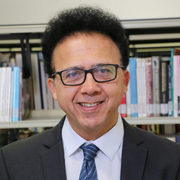
– Professor Jamil Khader is Dean of Research at Bethlehem University, Professor of English, and Editor at The Bethlehem University Journal. He contributed this article to The Palestine Chronicle.

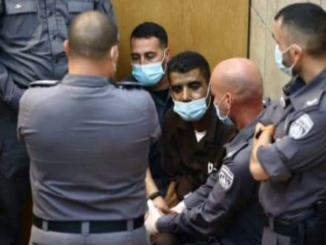
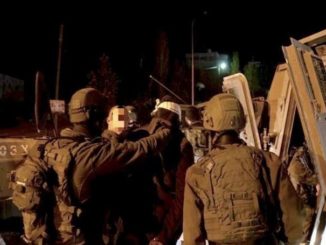
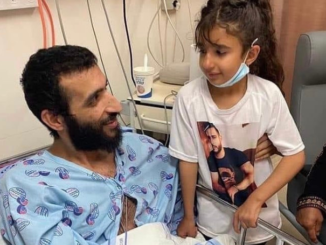




A well-written, and exhaustive article by Professor Khader. Violence in the Palestinian communities within the ehnocratic zio state is abhorrent, to say the least. The shared interest of the Palestinian Arab community lies within a framework of solidarity and an urgent education programme. Neither the time, nor the world at large are on our side. This issue must be solved within the community itself. Remember the zio saying “a good Arab is a dead Arab” This should remind this young men of who the real criminal is.
a comprehensive and convincing article, very restrained in tone, since, for the layman, rage upon rage must be the natural response to the “Ongoing Nakba”. We are approaching the anniversary of the murder of Count Bernadotte, a signal incident in Jewish terrorisms’ foul history. Together with the murder of Mr Rabin, this atrocity ought to feature in any account of the genesis of religio-Zionist extremism. Today sees the culmination of the regime of violence , the foundation stone of the Jewish and democratic State, a sort of ratification/sanctification of the Baruch Goldstein tendency , little known in “the West” . Thanks to Prof Khader for telling it as it is.